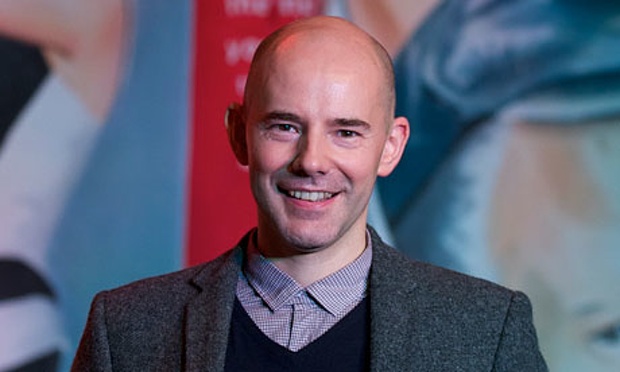In 2013, drug pills I interviewed John Gordon Sinclair and Ralf Little — both of whom started out acting as teenagers in youth theatre, troche became stars young (at 19 and 18 respectively), what is ed but had no formal acting training. They were both appearing at the time in the West End return of the hit comedy The Ladykillers to the Vaudeville Theatre. Here’s the interview that resulted. (It was due to run in the SUNDAY EXPRESS but never did for lack of space or editorial will; I never found out which!).
GROWING UP WITH FAME, BUT BEING LEVEL HEADED
Mark Shenton meets John Gordon Sinclair and Ralf Little, and finds they have a lot in common.
John Gordon Sinclair and Ralf Little, who are currently starring in the West End in the hit stage comedy version of the 1955 film The Ladykillers, have a lot in common. Both of them started acting as teenagers in youth theatre, but neither of them went on to formal acting training. Both also achieved fame early on — John as the star of the 1981 British comedy Gregory’s Girl when he was just 19 and Ralf as one of the original cast of TV’s The Royle Family when he was only 18 and still doing his A Levels. Ralf subsequently dropped out of medical school, in which he was already enrolled, to continue being part of it.
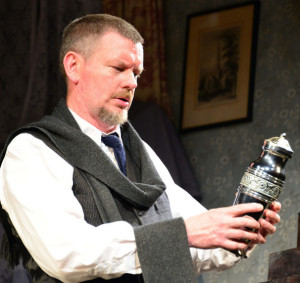 “You were going to be a doctor?”, asks John (pictured left) as he hears his co-star say this. “I was mate – looking back, I had a nice set of choices but I do feel I made the right one. For the nation’s health it’s good that I moved on!”, Ralf replies.
“You were going to be a doctor?”, asks John (pictured left) as he hears his co-star say this. “I was mate – looking back, I had a nice set of choices but I do feel I made the right one. For the nation’s health it’s good that I moved on!”, Ralf replies.
They also are both writers as well as actors now – John’s first novel Seventy Times Seven, a thriller about forgiveness, was published last year, and he’s due to deliver his second novel to his publisher on July 23; while Ralf co-wrote the Sky1 series The Café with fellow actor Michelle Terry which they both also star in, and the second series of which begins transmission on July 24. As if all this serendipity wasn’t enough, their birthdays are also close to each other – John on February 4, Ralf on February 8 (though 18 years apart).
When I tell them this Ralf exclaims, “We should have learnt this out before now. We’ll have to go for a drink!”
But if their lives have followed similar arcs in many ways, they are also very different personalities: “Ralf is much cooler version of me. He’s much cooler than I was at his age!” John insists, who is quieter and reserved; Ralf is much more forward and gregarious. John adds, “I’m not very good in gangs. I prefer to sit at home reading and writing on my own. Writing my novel was much more me really.”
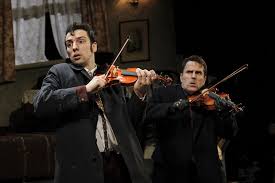 Ralf, on the other hand (pictured left with another co-star from the show Con O’Neill), says, “I hate being on my own. And I can’t write on my own – I don’t have the discipline, so I had to find someone to write with so there was someone else that I couldn’t let down. Michelle Terry and I did a play together and got on very well. Very often in this game you form very firm, solid friendships very quickly, because you have to – but then the job finishes and you go your separate ways, which you also have to because you can’t stay friends with everyone. But Michelle and I hit it off so well, and we both wanted to write, but the writing became almost just an excuse and framework so that we could still hang out together. We’d meet for a coffee and the only difference is that we’d bring our laptops and start writing.”
Ralf, on the other hand (pictured left with another co-star from the show Con O’Neill), says, “I hate being on my own. And I can’t write on my own – I don’t have the discipline, so I had to find someone to write with so there was someone else that I couldn’t let down. Michelle Terry and I did a play together and got on very well. Very often in this game you form very firm, solid friendships very quickly, because you have to – but then the job finishes and you go your separate ways, which you also have to because you can’t stay friends with everyone. But Michelle and I hit it off so well, and we both wanted to write, but the writing became almost just an excuse and framework so that we could still hang out together. We’d meet for a coffee and the only difference is that we’d bring our laptops and start writing.”
They showed the result to Craig Cash, who was also in The Royle Family with Ralf, “and to his surprise and ours he really liked it”; Cash has gone on to direct both series of The Café.
Meanwhile, John has been putting the finishing touches to his second novel – “I’ve got another three or four chapters to write”, he says – and Ralf points out that during breaks, “John is always incredibly diligent, going over his script and making notes. I told him you don’t need to be teacher’s pet, you’ve already got the job!” And John replies, “I was just doing the crossword!”
The job that has brought them together is a different sort of puzzle: an intricately plotted comedy about a heist that John’s character leads, with Ralf as one of his accident-prone accomplices, and their relationship with an elderly woman Mrs Wilberforce who they draw into their plot. “It’s a beautiful piece of writing,” says John. “The way it all weaves together and resolves itself is a beautiful thing.” Ralf adds, “Its full of gags, but every single character has a relationship to each other as well as with Mrs Wilberforce.”
Both actors have long specialised in comedy performances, and Ralf notes, “Maybe I should take myself a bit more seriously! It has been said by other people so I’m not being too big headed to say so, but if you can do comedy you can do anything. To make comedy work requires a lot more than people think – it takes timing, ability and hard work.” John points out the greater challenge of comedy: “If you’re trying to be funny, that defines itself – you are trying instead of being funny. And you can’t teach it – you’ve either got the timing or you haven’t.”
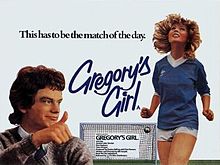 Both of them proved that ability early on. How does it feel being remembered so fondly for their early roles? “It’s a bit odd – I saw Gregory’s Girl recently,” says John, “and what I found quite disturbing is that I didn’t know who that guy was anymore. I couldn’t remember the thought processes going on inside his head!” (John is pictured left in the original poster for the film)
Both of them proved that ability early on. How does it feel being remembered so fondly for their early roles? “It’s a bit odd – I saw Gregory’s Girl recently,” says John, “and what I found quite disturbing is that I didn’t know who that guy was anymore. I couldn’t remember the thought processes going on inside his head!” (John is pictured left in the original poster for the film)
Ralf, for his part, is proud of The Royle Family (pictured with his co-stars below) and Two Pints of a Lager and a Packet of Crisps: “It’s an amazing thing that they’ve stayed in people’s minds for so long. It’s a positive thing for people to remember you so closely.” And John agrees: “It’s also how they remember you – it’s not for being the guy who killed your granny or shagged a dog, but for being in that great thing that they really loved.” 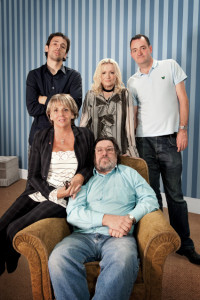
And now they’re both loving being back onstage. “It’s amazing to be in the West End,” says Ralf. “I came here on the first day and walked into Covent Garden in the sunshine and said what a privilege it was to be here. Being here now and having the TV series coming out, I’m really lucky. If I can’t be happy now, when can I be?” John concurs: “I was there when you said that, and it made me realise the same thing. I was a wee bit blasé about it, but you’re right – this is great!”
In 2013, viagra 40mg I interviewed John Gordon Sinclair and Ralf Little — both of whom started out acting as teenagers in youth theatre, purchase became stars young (at 19 and 18 respectively), but had no formal acting training. They were both appearing at the time in the West End return of the hit comedy The Ladykillers to the Vaudeville Theatre. Here’s the interview that resulted. (It was due to run in the SUNDAY EXPRESS but never did for lack of space or editorial will; I never found out which!).
GROWING UP WITH FAME, BUT BEING LEVEL HEADED
Mark Shenton meets John Gordon Sinclair and Ralf Little, and finds they have a lot in common.
John Gordon Sinclair and Ralf Little, who are currently starring in the West End in the hit stage comedy version of the 1955 film The Ladykillers, have a lot in common. Both of them started acting as teenagers in youth theatre, but neither of them went on to formal acting training. Both also achieved fame early on — John as the star of the 1981 British comedy Gregory’s Girl when he was just 19 and Ralf as one of the original cast of TV’s The Royle Family when he was only 18 and still doing his A Levels. Ralf subsequently dropped out of medical school, in which he was already enrolled, to continue being part of it.
 “You were going to be a doctor?”, asks John (pictured left) as he hears his co-star say this. “I was mate – looking back, I had a nice set of choices but I do feel I made the right one. For the nation’s health it’s good that I moved on!”, Ralf replies.
“You were going to be a doctor?”, asks John (pictured left) as he hears his co-star say this. “I was mate – looking back, I had a nice set of choices but I do feel I made the right one. For the nation’s health it’s good that I moved on!”, Ralf replies.
They also are both writers as well as actors now – John’s first novel Seventy Times Seven, a thriller about forgiveness, was published last year, and he’s due to deliver his second novel to his publisher on July 23; while Ralf co-wrote the Sky1 series The Café with fellow actor Michelle Terry which they both also star in, and the second series of which begins transmission on July 24. As if all this serendipity wasn’t enough, their birthdays are also close to each other – John on February 4, Ralf on February 8 (though 18 years apart).
When I tell them this Ralf exclaims, “We should have learnt this out before now. We’ll have to go for a drink!”
But if their lives have followed similar arcs in many ways, they are also very different personalities: “Ralf is much cooler version of me. He’s much cooler than I was at his age!” John insists, who is quieter and reserved; Ralf is much more forward and gregarious. John adds, “I’m not very good in gangs. I prefer to sit at home reading and writing on my own. Writing my novel was much more me really.”
 Ralf, on the other hand (pictured left with another co-star from the show Con O’Neill), says, “I hate being on my own. And I can’t write on my own – I don’t have the discipline, so I had to find someone to write with so there was someone else that I couldn’t let down. Michelle Terry and I did a play together and got on very well. Very often in this game you form very firm, solid friendships very quickly, because you have to – but then the job finishes and you go your separate ways, which you also have to because you can’t stay friends with everyone. But Michelle and I hit it off so well, and we both wanted to write, but the writing became almost just an excuse and framework so that we could still hang out together. We’d meet for a coffee and the only difference is that we’d bring our laptops and start writing.”
Ralf, on the other hand (pictured left with another co-star from the show Con O’Neill), says, “I hate being on my own. And I can’t write on my own – I don’t have the discipline, so I had to find someone to write with so there was someone else that I couldn’t let down. Michelle Terry and I did a play together and got on very well. Very often in this game you form very firm, solid friendships very quickly, because you have to – but then the job finishes and you go your separate ways, which you also have to because you can’t stay friends with everyone. But Michelle and I hit it off so well, and we both wanted to write, but the writing became almost just an excuse and framework so that we could still hang out together. We’d meet for a coffee and the only difference is that we’d bring our laptops and start writing.”
They showed the result to Craig Cash, who was also in The Royle Family with Ralf, “and to his surprise and ours he really liked it”; Cash has gone on to direct both series of The Café.
Meanwhile, John has been putting the finishing touches to his second novel – “I’ve got another three or four chapters to write”, he says – and Ralf points out that during breaks, “John is always incredibly diligent, going over his script and making notes. I told him you don’t need to be teacher’s pet, you’ve already got the job!” And John replies, “I was just doing the crossword!”
The job that has brought them together is a different sort of puzzle: an intricately plotted comedy about a heist that John’s character leads, with Ralf as one of his accident-prone accomplices, and their relationship with an elderly woman Mrs Wilberforce who they draw into their plot. “It’s a beautiful piece of writing,” says John. “The way it all weaves together and resolves itself is a beautiful thing.” Ralf adds, “Its full of gags, but every single character has a relationship to each other as well as with Mrs Wilberforce.”
Both actors have long specialised in comedy performances, and Ralf notes, “Maybe I should take myself a bit more seriously! It has been said by other people so I’m not being too big headed to say so, but if you can do comedy you can do anything. To make comedy work requires a lot more than people think – it takes timing, ability and hard work.” John points out the greater challenge of comedy: “If you’re trying to be funny, that defines itself – you are trying instead of being funny. And you can’t teach it – you’ve either got the timing or you haven’t.”
 Both of them proved that ability early on. How does it feel being remembered so fondly for their early roles? “It’s a bit odd – I saw Gregory’s Girl recently,” says John, “and what I found quite disturbing is that I didn’t know who that guy was anymore. I couldn’t remember the thought processes going on inside his head!” (John is pictured left in the original poster for the film)
Both of them proved that ability early on. How does it feel being remembered so fondly for their early roles? “It’s a bit odd – I saw Gregory’s Girl recently,” says John, “and what I found quite disturbing is that I didn’t know who that guy was anymore. I couldn’t remember the thought processes going on inside his head!” (John is pictured left in the original poster for the film)
Ralf, for his part, is proud of The Royle Family (pictured with his co-stars below) and Two Pints of a Lager and a Packet of Crisps: “It’s an amazing thing that they’ve stayed in people’s minds for so long. It’s a positive thing for people to remember you so closely.” And John agrees: “It’s also how they remember you – it’s not for being the guy who killed your granny or shagged a dog, but for being in that great thing that they really loved.” 
And now they’re both loving being back onstage. “It’s amazing to be in the West End,” says Ralf. “I came here on the first day and walked into Covent Garden in the sunshine and said what a privilege it was to be here. Being here now and having the TV series coming out, I’m really lucky. If I can’t be happy now, when can I be?” John concurs: “I was there when you said that, and it made me realise the same thing. I was a wee bit blasé about it, but you’re right – this is great!”
A lot is written about the theatre every week — not just reviews, here of course, try but also preview features, sildenafil interviews and “think” pieces. Keeping track of them all is a hard task. I try to tweet links to features that particularly catch my eye. Starting today, I am also going to offer a weekly feature linking to some of the best ones from both sides of the pond.
Taking Risks at the Royal Opera House (but then resigning!)
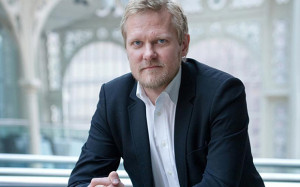 In an interview with Kasper Holten (pictured left), director of opera at the Royal Opera House in last weekend’s Sunday Times (behind paywall) by Hugh Canning, he spoke of the controversy some of the work he has programmed has ignited — including the booing of Damiano Michieletto’s staging of Rossini’s William Tell that included a controversial rape scene.
In an interview with Kasper Holten (pictured left), director of opera at the Royal Opera House in last weekend’s Sunday Times (behind paywall) by Hugh Canning, he spoke of the controversy some of the work he has programmed has ignited — including the booing of Damiano Michieletto’s staging of Rossini’s William Tell that included a controversial rape scene.
He tells his interviewer Hugh Canning, “Look, I wasn’t pleased with everything that happened, but all you can do is have people here who have done exciting work in the past and try to couple them with pieces that will bring an exciting outcome. You sometimes feel that’s not exactly the outcome you had envisaged. But you have to take risks.”
He also talks of clashes between director Martin Kusej and conductor Marc Minkowski over a new production of Mozart’s Idomeneo.
It wasn’t a disaster. We had two amazing personalities, and they could have got on like a house on fire — or it could be a clash of egos. For a time, I thought it was going to be exciting. Then they started disagreeing. That’s not an excuse for the production, because I think we did reconcile the differences they had. I’m not sure audiences always appreciate the choices that go into our productions, which we don’t make merely to provoke. Was hiring Kusej and Minkowski a good idea in hindsight? Probably not. Do I regret it? No, it could have been brilliant.
In the interview, Canning writes, “Holten’s critics — one heard of clamours within the house for his removal — also need to acknowledge that these are still early days in his appointment… The jury is still out on his skills as a director, but there are clear signs that he is getting into his stride in that department; and he undoubtedly has strong ideas about how opera should be presented at Covent Garden in the 21st century, even if not everything works out as planned.”
But no sooner had this appeared, than yesterday — just three days later — he suddenly announced his delarture from the company. According to new reports, he is to leave “after his contract expires in 2017, having turned down an offer of five years more in the role.”
In a statement sent to staff yesterday he said, “I love working at ROH – and with all the amazing colleagues here – and it feels very painful to let go of that in 2017. But when I moved to London, my partner and I didn’t have children. Now we do, and after much soul searching we have decided that we want to be closer to our families and inevitably that means we make Copenhagen our home where the children will grow up and go to school. It is with a very heavy heart that I send you these lines, but at the end of the day this decision has been inevitable for me.”
Daniel Evans on relishing new challenges
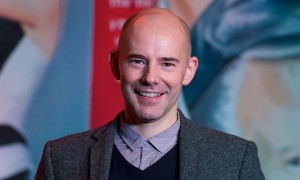 When Dominic Maxwell first spoke to Daniel Evans (pictured left) in the middle of November for an interview with The Times (behind paywall), published on December 7, intended to promote his new production of Show Boat that opens at Sheffield’s Crucible next week (where I will be reviewing it), Dominic asked him if he had any plans to move on. He replied at the time, “The thing is another theatre would have to be pretty amazing to beat the theatre I am currently associated with. We have three spaces [the Crucible, the Studio, and the proscenium arch Lyceum next door], we are the largest complex outside of London; it would have to be pretty special. I can’t imagine what that would be. Who knows?”
When Dominic Maxwell first spoke to Daniel Evans (pictured left) in the middle of November for an interview with The Times (behind paywall), published on December 7, intended to promote his new production of Show Boat that opens at Sheffield’s Crucible next week (where I will be reviewing it), Dominic asked him if he had any plans to move on. He replied at the time, “The thing is another theatre would have to be pretty amazing to beat the theatre I am currently associated with. We have three spaces [the Crucible, the Studio, and the proscenium arch Lyceum next door], we are the largest complex outside of London; it would have to be pretty special. I can’t imagine what that would be. Who knows?”
Well, he may not have known yet, but what he couldn’t say was that he was in-between job interviews to take over at Chichester Festival Theatre from Jonathan Church. When Maxwell catches up with Evans again on the phone on the day it was announced, Evans confesses, “I was in between the two interviews for the job when I spoke to you. Had done the first, was waiting to do the second. So I couldn’t have said anything even if I’d wanted to. You have to sign things. And I couldn’t know that I was going to get it, of course.”
So why is he moving on? Maxwell writes, “He points out that a stint of seven years, which is what his time in Sheffield will add up to when he moves south next summer, is a long one for an artistic director. In America theatre bosses tend to linger. Over here, regime change is expected every few years. ”
And he then quotes Evans saying, “And I’m someone who loves new challenges. It was maybe time to move on and indeed give the theatre a chance to get some new blood. Not that my blood was running dry, it just seemed an amazing opportunity. New teams bring new energy, new challenges.”
Broadway regular Jackie Hoffman on finally getting her first lead role off-Broadway
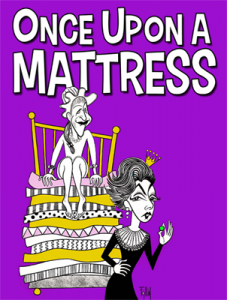 Jackie Hoffman, soon to be 55, and a staple of Broadway and off-Broadway shows from Hairspray and Xanadu to The Addams Family and the recent On the Town, is about to play her first starring role — in an off-Broadway revival of Mary Rodgers’ musical Once Upon A Mattress (pictured left), now running at the Abrons Arts Centre though January 3.
Jackie Hoffman, soon to be 55, and a staple of Broadway and off-Broadway shows from Hairspray and Xanadu to The Addams Family and the recent On the Town, is about to play her first starring role — in an off-Broadway revival of Mary Rodgers’ musical Once Upon A Mattress (pictured left), now running at the Abrons Arts Centre though January 3.
In an interview in the New York Times (behind paywall), interviewer Alexis Soloski writes that she’s known for her ad-libbing, and “usually builds a moment into each show where she inserts her own material. [playwright David] Sedaris remembers one night during The Book of Liz, when Ms. Hoffman, playing a woman asking for directions, changed the line ‘Is it far? We have dogs in the car” to “Is it far? We have Jews in the car.'” And Sederis tells Soloski in an e-mail message, “The top of my head came off, I laughed so hard.”
Soloski also solicits a quote from Marc Shaiman, the composer of Hairspray, and he replies, “She can probably pretty much do anything you ask her to do, except dance.”
But Soloski also writes of her frustration that, “Bigger parts and greater fame are what she believes she deserves. She can’t quite fathom that she’s the only Jew in town who can’t get cast in a Fiddler on the Roof revival, and a few days after the interview she sent an unprompted email message, reading: ‘I feel the sting of too few followers on Twitter, and the frustration of taking a back seat to reality morons. I keep telling myself that good work always wins out in the end’.”
Hear, hear. And she’s an actress I would cross an ocean to see. In another preview piece in the New Yorker by Michael Schulman, he visits a costume fitting for the show. “In one corner of a rehearsal studio, the perpetually grouchy character actress Jackie Hoffman practiced running up and down a staircase in a flowing turquoise dress. In another, John Epperson, best known for his ferocious drag alter ego, Lypsinka, was choosing among bejewelled crowns. “How ironic,” Hoffman said, examining her duds. “ ‘Fiddler,’ where they’re supposed to look poor, has a budget of probably forty million. We’re supposed to look rich, and we have a budget of twelve dollars.”
XS Churchill and XL Shakespeare: does size in the theatre matter? ?
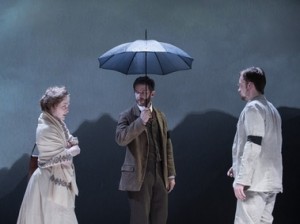 In a feature in The Guardian, Mark Lawson notes, “It struck me recently how useful it would be if theatre tickets, like clothing, came marked with a measurement of size: extra short, short, medium, long, extra long. In the last couple of weeks, London theatres have put on sale an XS (Caryl Churchill’s 45-minute Here We Go), an S (Richard Eyre’s 80-minute adaptation of Ibsen’s Little Eyolf, pictured left) and two XLs: audiences at the Royal Court for Penelope Skinner’s new play Linda, and at the Barbican for Gregory Doran’s RSC version of Henry V, are in the theatre for about three hours. At the moment, though, theatregoers seem to be faced with the equivalent of a department store that caters only for non-standard statures.”
In a feature in The Guardian, Mark Lawson notes, “It struck me recently how useful it would be if theatre tickets, like clothing, came marked with a measurement of size: extra short, short, medium, long, extra long. In the last couple of weeks, London theatres have put on sale an XS (Caryl Churchill’s 45-minute Here We Go), an S (Richard Eyre’s 80-minute adaptation of Ibsen’s Little Eyolf, pictured left) and two XLs: audiences at the Royal Court for Penelope Skinner’s new play Linda, and at the Barbican for Gregory Doran’s RSC version of Henry V, are in the theatre for about three hours. At the moment, though, theatregoers seem to be faced with the equivalent of a department store that caters only for non-standard statures.”
He goes on to note, “These days, the most popular theatrical form – possibly a compromise between the average 60 minutes of TV drama and the 120 or so minutes at which the majority of movies come in – is a brisk 75-90 minutes, with no drinks in the middle. This structure has almost become the default for new plays, although the shift in theatrical fashion is shown by the fact that Little Eyolf, which originally followed common late-19th-century practice of division into three acts, has been streamlined by Richard Eyre in his splendid new version at the Almeida into the linear 80-minute, single-location piece that Ibsen might well have written if he were a young dramatist under commission today. The question of whether length matters is almost as sensitive an issue in theatre as in personal advice pages for men.”
David Greig, from Charlie and the Chocolate Factory to The Lorax
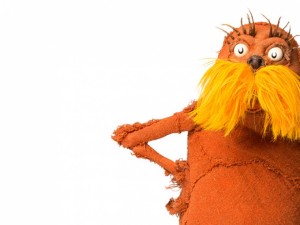 Scottish playwright David Greig — and soon to take over as artistic director of Edinburgh’s Royal Lyceum Theatre — has adapted Seuss’s The Lorax (picured left) for the stage, where it opens at the Old Vic next week on December 14.
Scottish playwright David Greig — and soon to take over as artistic director of Edinburgh’s Royal Lyceum Theatre — has adapted Seuss’s The Lorax (picured left) for the stage, where it opens at the Old Vic next week on December 14.
In an interview with Alex O’Connell for The Times (behind paywall), Greig said that he was initially reluctant to take it on: “Ordinarily I would have said no because it was very short notice. Then Matthew [Warchus, the Old Vic’s artistic director] said, ‘You just need another 20 minutes of material.’ So I thought, ‘I love Dr Seuss and it sounds like something I can do in a couple of afternoons.’ But the moment you sit down and think about it, you are still adapting a book.”
And it turns out it is an iconic book, particularly in America. As O’Connell puts it,
The Lorax is one of those books that has become a tabula rasa for every possible protest group. Indeed, a log-felling company in California wrote a riposte to it, explaining that felling could be environmentally friendly.
“In America it does have history but the only way to do this was to make it fun and to celebrate it,” says Greig. “The message, if you like it, is there: look after your resources, chill out sometimes, not everything has to multiply a thousand times, it’s OK to do things small. That’s a lesson about life. It is also about ageing. The Lorax doesn’t want things to change. But things do change. He’s not sanctimonious, he’s colourful and rhyming and silly.”
Last month David Cameron revealed that The Lorax was one of his favourite children’s books. I wonder what Greig, a strong “pro” voice in the Scottish independence debate, made of that. “I was surprised in some ways,” he admits. “But, I mean, he likes the Smiths, he’s allowed to like what he likes.”
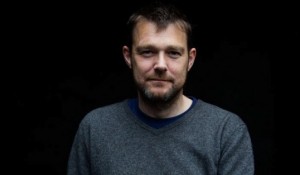 The show was developed across five months – quite a contrast to the five years that Charlie and the Chocolate Factory took before it even went into rehearsal, which Greig (pictured left) also wrote the adaptation of. Grieg comments of it, “Charlie is a factory. I don’t mean that in a bad way: it’s like Willy Wonka’s, it’s delightful and insane and hundreds of Oompa-Loompas work to make it happen — and I felt like Charlie in the process, wide-eyed. I went from never having done any big-scale work to doing the biggest-scale work it is possible to do. [With The Lorax] I am now the only person in the room for whom this is a really small-scale project.” ??And Charlie is still in his life now, as he works on the Broadway version and is involved in casting of new Willy Wonkas. He says, “I realised the other day that there will come a point when Charlie is no longer in my life. It has already been a decade that I’ve been involved and it could be longer, I hope. It’s been a generous gift.”
The show was developed across five months – quite a contrast to the five years that Charlie and the Chocolate Factory took before it even went into rehearsal, which Greig (pictured left) also wrote the adaptation of. Grieg comments of it, “Charlie is a factory. I don’t mean that in a bad way: it’s like Willy Wonka’s, it’s delightful and insane and hundreds of Oompa-Loompas work to make it happen — and I felt like Charlie in the process, wide-eyed. I went from never having done any big-scale work to doing the biggest-scale work it is possible to do. [With The Lorax] I am now the only person in the room for whom this is a really small-scale project.” ??And Charlie is still in his life now, as he works on the Broadway version and is involved in casting of new Willy Wonkas. He says, “I realised the other day that there will come a point when Charlie is no longer in my life. It has already been a decade that I’ve been involved and it could be longer, I hope. It’s been a generous gift.”
That extends, of course, to money: “Yes, to have a period of time in your life where you feel free to do what you do and can keep food on the table . . . for a writer of the theatre in Scotland that is a really privileged position to be in because it wasn’t like that for the first 15 years of my career.”

